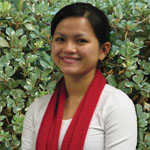Research close to home

Research close to home
- May 29, 2008
- Undergraduate psychology major Leyna Vo returns to her roots in order to impact Vietnamese mental healthcare
-----
 Hours spent writing and rewriting proposals: 100+. Travel time one-way to Vietnam:
16 hours. Temperature and humidity levels endured for five weeks: 90s. Mosquito bites
accrued: countless. For psychology major Leyna Vo, the opportunity to spend a summer
studying in the Vietnamese village of her birth was indeed: priceless.
Hours spent writing and rewriting proposals: 100+. Travel time one-way to Vietnam:
16 hours. Temperature and humidity levels endured for five weeks: 90s. Mosquito bites
accrued: countless. For psychology major Leyna Vo, the opportunity to spend a summer
studying in the Vietnamese village of her birth was indeed: priceless.
Born in Binh Dinh province, Vo's family immigrated from Vietnam to the U.S. in search
of better educational opportunities when she was six years old. Aside from a brief
visit two years later, she had not been back.
Last summer, more than 15 years later, the fourth year undergrad and Student Achievement
Guided by Experience (SAGE) scholar returned to the small rural province she once
called home looking for answers for both her research and her cultural heritage.
Vo took advantage of the unique opportunity to interview and interact with the people
in her home village in an effort to better understand Vietnamese attitudes toward
mental health
and counseling services - topics she says are off limits in traditional Asian culture.
"The Asian culture is a very collective community," says Vo. "It's a commonly held
belief that everything a person does is a reflection upon the family."
She speaks from experience, having grown up in a traditional Asian household. "When
I decided to break the mold and pursue a degree in psychology, I had some explaining
to do," says Vo whose parents expected she would take the "traditional" route into
medicine as had her older brother. The idea of Asians, specifically Vietnamese, seeking
out counseling services, she says, is equally taboo even when those services may well
be warranted.
"The people in Vietnam have experienced events that, in addition to common ailments,
could very easily - and understandably - weigh on their mental health," she says,
pointing to stresses brought on from the decade long war fought there in the 60s and
70s.
Through her research, she is determined to learn more about Asian culture and perceptions
in order to develop better strategies and methods to provide counseling services to
those who, out of tradition, may not seek help when needed.
"The experience was invaluable," says Vo, explaining that she came home with much
more than she had hoped. "In addition to learning about perceptions of counseling
in Vietnam, I experienced and observed many of the traditions I had only heard about,
but never experienced first hand."
Vo's study is one of many she has completed while at UC Irvine, all of which have
received funding from the university's Undergraduate Research Opportunity Program.
A previous study she completed on the Asian values gap between parents and children
and how types of family affection influence parent-child relationships was selected
by the American Psychological Association to be presented at one of their annual meetings.
It is currently being converted into manuscript form for publication consideration.
"Leyna's scholarship and dedication to research is truly one-of-a-kind," says Jeanett
Castellanos, Vo's mentor and director of the Social Sciences Academic Resource Center.
Vo hopes to return to Vietnam in fall 2008 to continue her research on Asian culture.
She then plans to transition into a graduate program in counseling psychology the
following year.
-----
Would you like to get more involved with the social sciences? Email us at communications@socsci.uci.edu to connect.
Share on:
Related News Items
- Careet RightNotes from a future professor
- Careet RightCan Opportunity Zones ever meet their poverty-fighting promise?
- Careet RightFei Yuan named one of ten global China Times Young Scholar Fellows
- Careet Right'Wired for Words: The Neural Architecture of Language,' an excerpt
- Careet RightEveryone's looking for a partner who has these 3 traits, according to research


